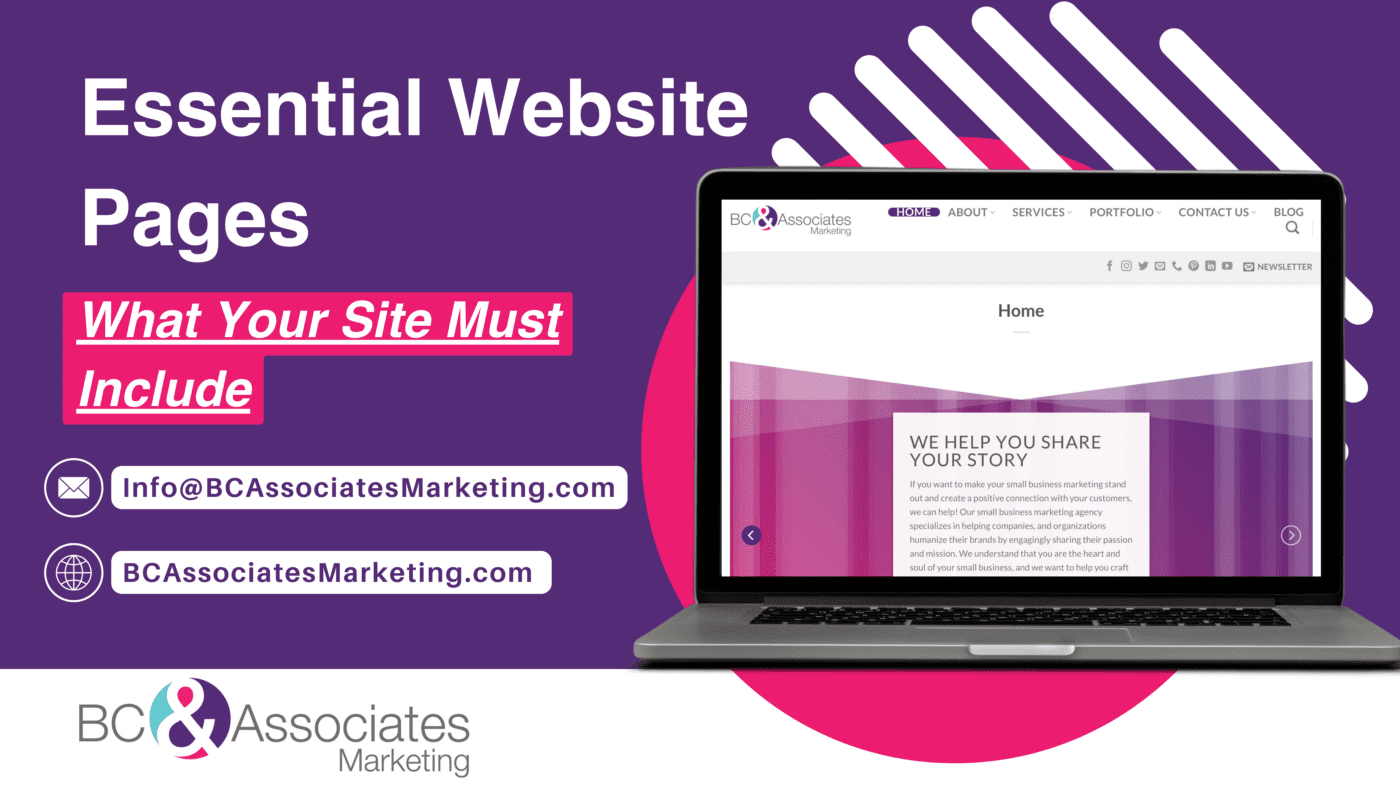To create a compelling and effective online platform, it’s crucial to know which pages your website must have. In this guide, we’ll explore the key foundational pages that every website should include. Understanding and implementing these essential pages will help you connect with your audience, convey your message effectively, and achieve your online goals.
-
Home
- Why: This is often the first impression visitors have of your business. It must quickly communicate your brand value proposition and guide visitors to key information.
- Tip: Use clear and concise messaging and captivating visuals, and ensure a logical flow of content. Include a compelling CTA to encourage further exploration.
- Bonus: Try to recreate the in-person experience!
-
About
- Why: It builds trust and provides insights into your business’s story, mission, and the people behind it.
- Tip: Share a compelling narrative, include team bios and photos, and use visuals to connect with your audience.
- Bonus: Make a media page with all the elements necessary to run a story about you. The less work a reporter has to do, the better!
-
Services
- Why: This page educates visitors on what your business offers, helping them understand why they should choose you.
- Tip: Start with a brief overview, use clear headings and bullet points, and highlight the advantages of your services. Include a CTA for visitors to explore your services in detail.
- Bonus: Include customer testimonials/social proof! Let them sell for you!
-
Product
- Why: It showcases your product offerings, providing potential customers with information to make informed decisions.
- Tip: Organize products logically, include detailed descriptions, high-quality images, and pricing.
- Bonus: Include customer testimonials/social proof! Let them sell for you!
-
FAQ
- Why: FAQs address common inquiries, reducing support requests and enhancing the user experience.
- Tip: Organize questions by topic, provide concise answers, and update it regularly.
- Bonus: These can be repurposed as social media posts!
-
Blogs
- Why: Blogs demonstrate expertise, boost SEO, and engage visitors.
- Tip: Plan content that addresses your target audience’s interests, use catchy headlines, and encourage sharing and engagement. Add CTAs to subscribe or share the blog posts.
- Bonus: Think 101- easy content to start and get more complex as you build your content library. Once you have enough content on each topic, consider making an ebook or other lead product you can give away or sell.
-
Contact
- Why: It makes it easy for visitors to contact you, turning potential leads into customers.
- Tip: Include multiple contact options, such as email, phone, and a contact form. Add social media links, appointment booking calendars, and business hours.
- Bonus: Make your phone number clickable so I can call directly without entering numbers!
-
Privacy Policy
- Why: It establishes trust by explaining how you handle visitor data and privacy.
- Tip: Clearly outline data collection practices, offer ways for visitors to access their data, and explain if data is shared.
-
Terms and conditions
- Why: It sets rules for using your website to protect your business.
- Tip: Cover governing laws intellectual property rights, and disclaim responsibility for third-party links.
-
Sitemap
- Why: It aids navigation, making finding content easier for users and search engines.
- Tip: Place the sitemap link in the footer for accessibility. If using WordPress, use plugins for an HTML sitemap.
-
Page not found
- Why: It provides a user-friendly experience when visitors encounter missing pages, preventing frustration.
- Tip: Inform visitors that the page is not found, offer a link to the homepage, and consider adding a search form.
- Bonus: You can have fun with this – make it personal!
These essential website pages lay the foundation for small businesses to establish a strong online presence. They serve the dual purpose of providing crucial information to visitors while guiding them toward meaningful actions. From the welcoming Home Page to informative About, Services, and Products Pages, along with the engaging Blog and user-friendly Contact Page, these elements work together to create a well-rounded online experience. When strategically placed Calls to Action (CTAs) are added to select pages, they encourage visitors to explore, engage, and take desired actions, ultimately helping small businesses build trust, connect with customers, and succeed in the digital landscape.
Want to learn about how important google analytics can be for your small business? Visit our blog post How To Understand Customers with Google Analytics for Small Business.
Additional Resources to Aid Your Marketing Journey
- The Ultimate Guide to Building a Strong Service-Based Brand
- The Power of Storytelling in Marketing Your Service-Based Business
- SEO Best Practices for Service-Based Businesses: Improve Search Rankings and Increase Organic Traffic
- Top 10 Common Digital Marketing Mistakes Service-Based Businesses Make and How to Avoid Them
- How to Measure and Analyze Your Digital Marketing Performance
- The A-Z Guide to Branding and Digital Marketing for Service-Based Businesses
Sources:
https://digital.com/how-to-create-a-website/must-have-pages/
https://wickedlybranded.com/elements/blog-posts/


